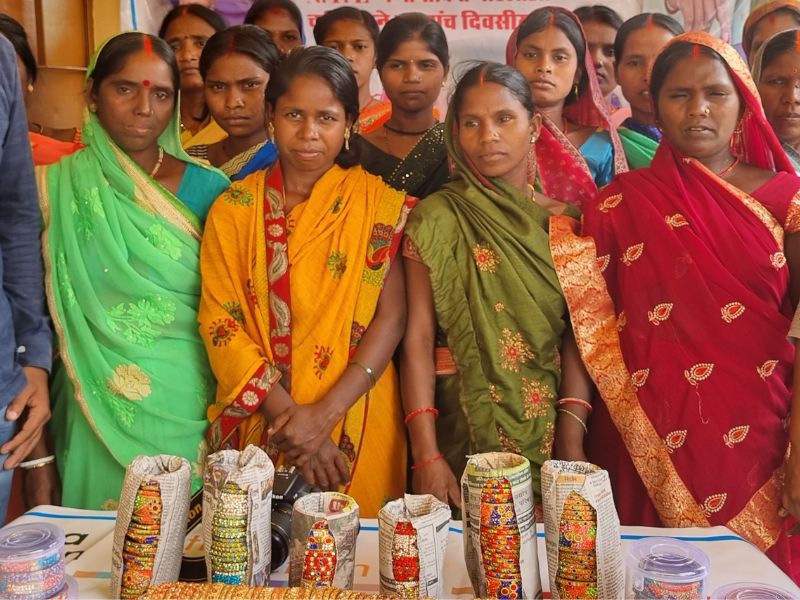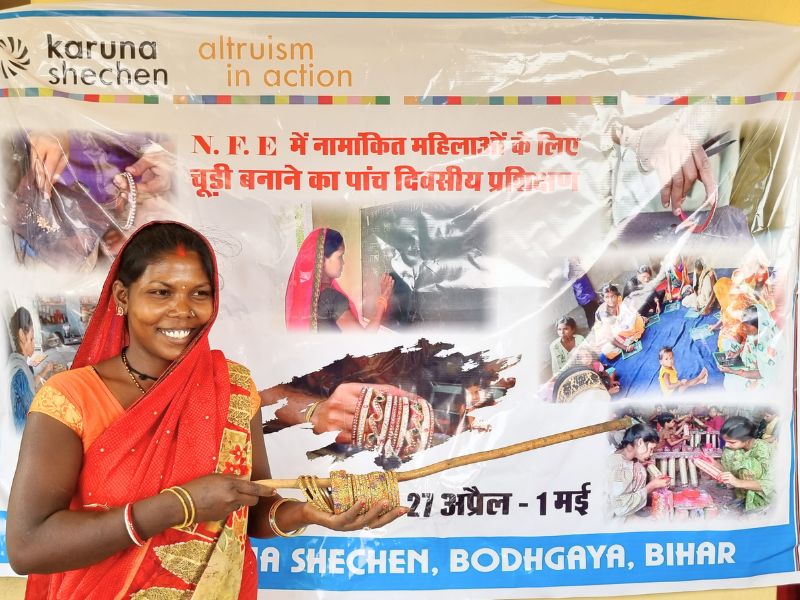Bangles are part of the cultural heritage of India and adorn the traditional attire of women. To preserve this tradition while offering new economic opportunities for village women in India, a program has been developed to teach them how to produce and sell these bangles.
Empowering Economic Independence
This project was launched as part of Karuna-Shechen’s economic development program.

This project was launched as part of Karuna-Shechen’s economic development program. The program aims to strengthen women’s autonomy by improving their quality of life and that of their community.
It offers training, economic support, and creates new professional opportunities, thereby enabling the surrounding villages to thrive.
Last but not least, the initiative not only enables women to deepen their basic literacy skills, but also gives them livelihood tools to ensure they are socially and economically empowered.
The Meeting of Tradition and Modernity



The bangle-making training combines tradition and modernity. While bangles were once made from lac, a natural resin that is expensive and complex to work with, modern materials such as plastic and metal are now used for their durability and affordability.
Participants learn to work with these modern materials while preserving traditional techniques such as hand engraving and bead inlay. This approach ensures the evolution of the craft while maintaining its cultural heritage.
Knowledge transfer occurs through a mentoring system where former participants, now instructors, share their expertise with the new participants..
Training: A Springboard to Sustainable Income
The program primarily targets women enrolled in Non-Formal Education (NFE) centers. These centers provide complementary training to traditional education, with practical workshops designed to develop professional skills.
Some women who participated in a microcredit program within the community were also able to attend the training sessions.

The sessions take place over three days in Bihar, with each stage designed to equip participants with practical skills:
– Day 1: Knowledge Transfer
The coordinators and instructors introduce the program’s objectives, emphasizing the importance of linking education to economic development.
They highlight that education should impart knowledge while providing practical, income-generating skills by sharing their experiences, teaching the art of making bangles, selecting materials, and selling their creations in local markets.

– Day 2: Training and Inspiration

The second day begins with an introduction to the essential materials. The women then discover the most popular jewelry designs on the market.
Afterward, time is allocated for each participant to practice, explore their creativity, and exchange ideas with others.
– Day 3: Practical Application
On the final day, the aspiring creators are divided into groups and tasked with creating sets of bangles.
This allows them to refine their skills and experience the entire process from start to finish.
They leave with the bangles they have crafted, symbols of their learning and newfound independence.

Since receiving initial support from the organization, we’ve become self-reliant, producing and selling bangles independently. I’m thrilled to pass on our knowledge to other women and help them succeed.
Premlata Devi, teacher at Karuna-Shechen’s NFE center in Bihar’s Karhara
A Sustainable Future for Craftsmanship



Looking ahead, Karuna-Shechen plans to expand this training project to other geographic areas and reach more communities. The goal is to create a sustainable ecosystem where cultural preservation and economic opportunities coexist harmoniously.
Your support is crucial and greatly appreciated. By contributing to this project you will help rural women diversify their sources of income.
